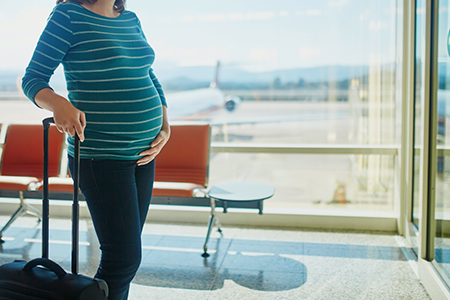
Pregnant women can generally travel safely with a little preparation. But they should avoid some destinations including those with Zika and malaria risk. Learn about steps you can take if you're pregnant and planning an international trip, especially to a developing country. Follow these tips to keep you and your baby safe and healthy.
Zika and malaria
The Zika virus is spread through mosquito bites and sex. Because Zika infection in a pregnant woman can cause severe birth defects, pregnant women should not travel to any area of risk of Zika. If you must travel to an area with Zika risk, take strict precautions to prevent mosquito bites and avoid sexual transmission. If you have a sex partner who lives in or has traveled to an area with Zika, you should use condoms for the rest of your pregnancy. Find out more at CDC's Zika Travel Information page or CDC's page about Zika and pregnancy.
Pregnant women also should avoid travel to areas with malaria. Malaria in pregnant women can be more severe than in women who are not pregnant. Malaria can increase the risk for serious pregnancy problems, including premature birth, miscarriage, and stillbirth. If you must go to an area while you are pregnant, talk to your doctor about taking a drug to prevent malaria. Malaria is spread by mosquitos, so you should also wear effective insect repellent and take other precautions to avoid mosquito bites.
Pretravel care and travel health insurance
The first thing you should do when planning an international trip is to make an appointment with a healthcare provider who specializes in travel medicine. You should ideally visit the travel clinic at least four to six weeks before you leave. A travel medicine specialist can review your itinerary, make recommendations based on the health risks at your destination, and give you any vaccines you may need. You should also talk to your obstetrician (OB/GYN) about your trip for advice on whether it's safe for you to travel. Your travel medicine doctor and your obstetrician may need to talk to each other about your care.
Next, consider how you are going to get care overseas, if you need it. Your health insurance in the United States might not pay for medical care in another country, so check with your insurance company. Consider getting supplemental travel health insurance and make sure the policy will also cover the baby if you give birth during your trip. If you are traveling to a remove area, an insurance policy that covers medical evacuation will pay for your transportation to a high-quality hospital in case of emergency.
Transportation issues
Before you book a flight, check how late in your pregnancy the airline will let you fly. Most will let you fly until 36 weeks, but some have an earlier cutoff. Your feet may become swollen on a long flight, so wear comfortable shoes and loose clothing and try to walk around every hour or so. Pregnancy makes blood clots during travel much more likely. To reduce your risk of a blood clot, your doctor may recommend compression stockings or leg exercises you can do in your seat.
If you are going on a cruise, check with the cruise line to find out if it has specific guidance for pregnant women. Most will not allow you to travel after 24-28 weeks of pregnancy, and you may need to have a note from your doctor stating you are fit to travel.
Car crashes are a leading cause of injury for healthy US travelers abroad. At your destination, always wear a seatbelt on a car or bus. A lap belt with shoulder strap is best, and the straps should be placed careful above and below your stomach.
Food and water safety
Travelers' diarrhea is caused by eating or drinking contaminated food or water. The dehydration caused by diarrhea can be more of a problem for pregnant women than for others. In addition, other bacteria and viruses spread by food or water can lead to more severe illnesses that can cause problems for a pregnant woman and her baby. Therefore, if you are traveling in a developing country, you should carefully follow food and water safety measures:
- Eat only food that is cooked and served piping hot.
- Do not eat cold food or food that has been sitting at room temperature (such as a buffet).
- Do not eat raw or undercooked meat or fish.
- Eat fresh fruits and vegetables only if you can peel them or wash them in clean water.
- Do not eat unpasteurized dairy products.
- Drink only water, sodas, or sports drinks that are canned or bottled and sealed (carbonated is safer because the bubbles indicate that is was sealed at the factory).
- Do not drink anything with ice in it - ice may be made with contaminated water.
If you get travelers' diarrhea, the best think to do is drink plenty of safe liquids while you wait for it to go away on its own. However, your doctor may give you an antibiotic you can take in case diarrhea is moderate or severe. Diarrhea is considered "moderate" when it is distressing or interferes with planned activities, and "severe" when it is disabling or completely prevents planned activities. Do not take products containing bismuth, such as Pepto-Bismol or Kaopectate. These medicines are not recommended for pregnant women.
